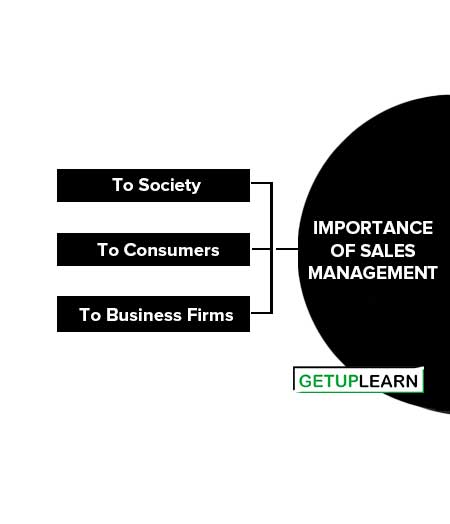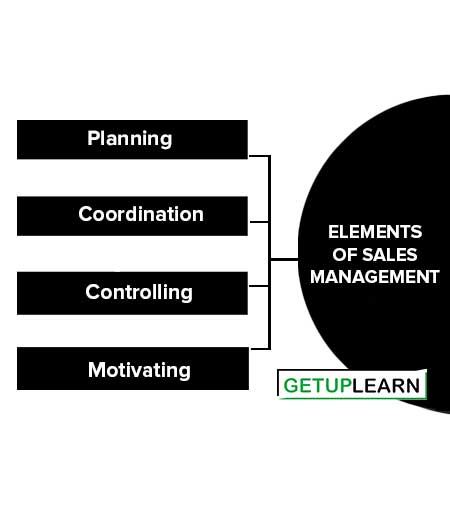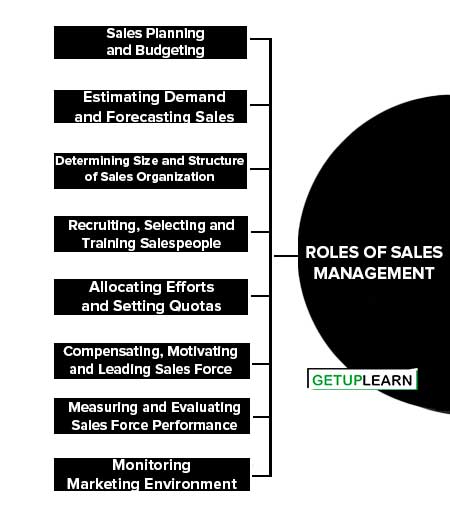Table of Contents
- 1 What is Sales Management?
- 2 Importance of Sales Management
- 3 Elements of Sales Management
-
4 Roles of Sales Management
- 4.1 Sales Planning and Budgeting
- 4.2 Estimating Demand and Forecasting Sales
- 4.3 Determining Size and Structure of Sales Organization
- 4.4 Recruiting, Selecting and Training Salespeople
- 4.5 Allocating Efforts and Setting Quotas
- 4.6 Compensating, Motivating and Leading Sales Force
- 4.7 Measuring and Evaluating Sales Force Performance
- 4.8 Monitoring Marketing Environment
- 5 FAQs About the Sales Management
What is Sales Management?
Sales management referred to the direction of sales force personnel. But, it has gained a significant position in today’s world. Now, sales management meant management of all marketing activities, including advertising, sales promotion, marketing research, physical distribution, pricing, and product merchandising.
The American marketers association (AMA’s) definition, takes into consideration a number of these viewpoints. Its definitions run like the planning, direction, and control of the personnel, and selling activities of a business unit including recruiting, selecting, training, assigning, rating, supervising, paying, and motivating, as all these tasks apply to the personnel sales force.
Further, it may be quoted: it is a socio-scientific process, involving’ group effort’ in the pursuit of common goals or objectives, which are pre-determined. Coordination is its key, though, no doubt, it is a system of authority, but the emphasis is on harmony and not conflict.
Sales management differs from other fields of management, mainly in different aspects: the selling operation of a business firm does not exist in isolation. Thus, simultaneous with the changes taking place in the business, as well as marketing orientation, a new concept of sales management has evolved.
The business, is now society-oriented, on human-welfare aspects. So, sales management has to work in a broader and newer environment, in co-existence with the traditional lines. The present emphasis is now on the total development of human resources.
Importance of Sales Management
The benefits or importance of sales management are as follows:

To Society
If jobs are to be made available for all those, who want and expect them, the economy must continuously expand its production of goods and services, which can only be done by adopting sound government policies and efficient use of people.
Equally important here is the fact, that an economy needs individuals, to sell what is produced. Through their persistent efforts to create and stimulate demand, salespeople could be said to be the life and blood of a productive economic system.
To Consumers
Professional people know their product or service, its major uses, limitations, and benefits; which helps them to serve their customers, quite effectively.
For example, an insurance agent can analyze the hazards and risks that confront a client’s business or home situation, examine existing coverage, and offer helpful advice, in order to eliminate the gaps or overlaps in coverage, in addition to saving the client’s money.
The sales-engineers are qualified to analyze technical problems, which may be confronting a particular organization and they can give the right recommendations for developing efficient operations.
To Business Firms
A business firm can be profitable only if its revenues exceed its costs. The prime responsibility of the salespersons is to sell the goods, produced by the organization, at a profit. Companies, salespeople, and customers are at different levels in the marketing chain; and these stand to benefit from sales- activities.
The creative salesperson tries to penetrate his territory and adopts suitable means and techniques of profitable-selling of goods and/or services. The salesperson, in the field, is an ideal person, to keep the company abreast, or ahead of the competition.
He, thus, becomes an important source of field intelligence by providing important (and sometimes very crucial) information, about the nature of competitive activities, and also about the changing needs of customers.
The sales force has the additional responsibility of serving the needs of customers that buy the firm’s product(s). Most firms cannot survive, only on the basis of one-time sales; repeat sales are necessary. This is possible only if the customers are served in a professional manner.
It is the only function or department in a company that is involved in generating revenue or income for the organization. The financial results of a firm depend on the performance of the sales department. Many salespeople are among the best-paid people in business. It is one of the fastest and surest routes to enter into the top management bracket.
Elements of Sales Management
The four basic elements of sales management are discussed below:

Planning
A business cannot be taken as a chance. Every salespeople or person concerned have to see the future, in a planned way like what must be done? And who will do it? The plan must be based on extensive market research, and the facts must be verified at every stage.
The plan should also be evaluated, after investigating the total market, for a particular type of product. Flexibility must be provided by establishing a specialist production line, to allow for variation in production. The plan should also be subject to continued review.
The details of the plan should be discussed, with all the departmental heads, concerned, and their subordinates, who bear responsibility for fulfilling their parts of the plan.
Coordination
Coordination is all pervasive and permeates every function of the management process. For example, ill planning, and departmental plans are integrated into a master. Plan, ensuring adequate coordination. Similarly, organizing starts by coordinating wholly, and partially inter-departmental, and inter-personnel matters.
Coordination also helps in the maximum utilization of human effort through the exercise of effective leadership, guidance, motivation, supervision, communication, etc. The control system also needs coordination. Coordination does not have any special techniques.
Controlling
The sales manager has to check regularly, that the sales activities are moving in the right direction or not. He guides, leads, and motivates the subordinates, so as to achieve the goals planned for the business. He has to take steps to ensure that the activities of the people conform to the plans and objectives of the organization.
The controlling system should be such that one can study the past, note the pitfalls and take corrective measures, so that similar problems may not occur in the future. The controller has to ensure that the set targets, budgets, and schedules are attained or followed in letter and spirit.
There must be procedures to bring to light the failure to attain a target. The control system has to:
- Prepare sales and market forecasts.
- Determine the level of the sales budget.
- Determine the sales quotas for each salesman.
- Determine, review, and select distribution channels.
- Organize an efficient sales force.
- Establish a system of sales reporting.
- Establish a system of statistical sales credit.
- Establish stock-control system(s).
- Review of performance of the sales- force.
Establish periodical testing programs. In a big organization, each salesman is assigned a territory (not so big that it cannot be adequately covered). Each salesman has a target, set for a specific ‘period. From the weekly and monthly sales reports, the control system is established, which will prepare records of whether a particular salesman is working efficiently or not.
Motivating
Motivation is essentially a human resource concept. It aims to weld together distinctive personalities into an efficient team. For this, knowledge of human psychology is needed, as a means of understanding behavior patterns. This is especially important in the case of the sales force. Only motivated salespersons can achieve the company’s goals.
Roles of Sales Management
Sales managers have broad responsibilities. They recruit, select and train sales personnel, provide them with reasonable goals, and motivate them to get the result. They coordinate the personal selling operations with other marketing activities.
Nowadays the sales manager is expected to play a much more strategic role in the company and is required to make a key input into the formulation of company plans. An essential sales leadership role is to establish a sense of purpose or vision and a clear direction to get there. It takes direction from the marketing strategy and is based on thorough research and a considered positioning of the company within the marketplace.
The following are the roles of sales management:
- Sales Planning and Budgeting
- Estimating Demand and Forecasting Sales
- Determining Size and Structure of Sales Organization
- Recruiting, Selecting and Training Salespeople
- Allocating Efforts and Setting Quotas
- Compensating, Motivating and Leading Sales Force
- Measuring and Evaluating Sales Force Performance
- Monitoring Marketing Environment

Sales Planning and Budgeting
The sales manager performs the task of sales planning. Sales planning as a process involve predicting demand for the product and demand for the sales assets (machines, people, or a combination of both). Failure to plan always means lost sales.
Planning ensures that when a consumer wishes to purchase the product, the product is available in the market. It also ensures that opportunities for additional sales are explored and the sales assets are available to exploit these opportunities.
Planning should allow for meeting the increasing customer demand for more products, services, and/or customization as the business is growing, but should also react quickly when demand decreases. Sales planning improves efficiency and decreases unfocused and uncoordinated activity within the sales process.
Estimating Demand and Forecasting Sales
The sales manager should estimate the market potential for the industry and sales potential for the company before developing a final sales forecast on which to base all operational planning and budgeting for their sales force. If the sales manager can estimate the demand properly, he will be able to assign his sales force as per the requirements.
Determining Size and Structure of Sales Organization
It is the responsibility of the sale manager to decide the number of salespeople for the sales organization. The sales manager should decide the job responsibilities of salespeople, sales forecasts, budgets, territory assignments, supervision, and sales force performance, etc. Depending on the size of the business, the sales manager decides the number of salespeople.
Recruiting, Selecting and Training Salespeople
The sales manager recruits qualified applicants for employment. They select the desirable candidates and provide them with the necessary training for the job.
Allocating Efforts and Setting Quotas
Allocating Sales Force Efforts and Setting Sales Quotas: To effectively allocate sales force efforts, the sales manager must first design sales territories and then it should be compared on the basis of sales potential, which in turn decides the individual sales quotas.
After-sales territories have been determined, management may design a formal pattern, or routing, for sales representatives to follow in calling on customers. While setting sales quotas, managers should set realistic quotas for the salespeople depending on the situation.
Compensating, Motivating and Leading Sales Force
A sales manager tries to motivate the sales force through different compensation processes. These compensations may be financial and non-financial compensation. Financial compensation should include reimbursement of sales expenses and transportation.
Non-financial incentives may include the use of a company car, office space, secretarial help, and special company benefits such as life insurance, a retirement plan, health care, etc.
Another major function of the sales manager is to lead the sales force in the proper direction. Salesforce leadership ought to be proactive and flexible. Sales managers may need to adjust their leadership style, ranging from autocratic control to free reign style depending on the situation.
Measuring and Evaluating Sales Force Performance
Sales force performance must be measured and evaluated to determine commissions and bonuses for salespeople and sales managers and to make promotion decisions. The overall purpose of performance evaluation is to improve organizational profitability by improving sales force efforts. The process of sales evaluation should be systematic and free from biasedness.
Monitoring Marketing Environment
The sales manager should closely monitor the marketing environment. They should satisfy the target customers within the constraints of a continuously changing marketing environment. Modern sales executives are professionals. They recognize that their main assignment is to build and maintain an effective sales organization.
They must be skilled in planning, coordinating, and controlling to ensure that personal selling activities make their optimum contributions to the marketing effort. Thus, the sales manager needs to perform the following duties and responsibilities in an organization:
- Determination of the sales force’s objectives and goals.
- Forecasting the sales requirements and budgeting.
- Specifying the sales force organization, sales force size, territory design, and planning.
- Selection, recruitment, and training of sales force.
- Motivating the sales force.
- Sales force evaluation and control.
FAQs About the Sales Management
What are the roles of sales management?
The following are the roles of sales management:
1. Sales Planning and Budgeting
2. Estimating Demand and Forecasting Sales
3. Determining the Size and Structure of the Sales Organization
4. Recruiting, Selecting, and Training Salespeople
5. Allocating Efforts and Setting Quotas
6. Compensating, Motivating, and Leading the Sales Force
7. Measuring and Evaluating Sales Force Performance
8. Monitoring Marketing Environment.
What are the elements of sales management?
The following are the four elements of sales management: 1. Planning, 2. Coordination, 3. Controlling, 4. Motivating.
